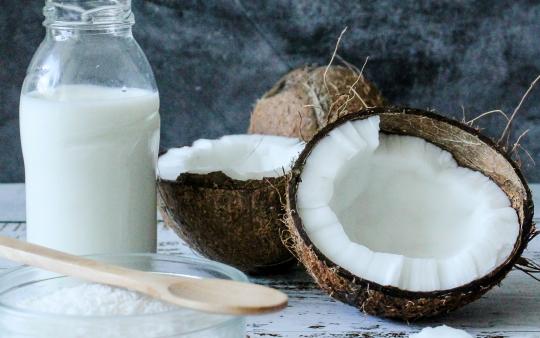The world’s gone nutty for coconut! Everyday pantry basics are going next level—from oils, to chips, to non-dairy milks, yogurts, and ice cream—coconut is á la mode!
But let’s talk about the humble can of coconut milk. You know the one, deep in the international aisle of your grocery store, rammed between ramen and garam masala. A staple in kitchens around the world long before reaching its current celebrity status, this creamy, sweet milk has been perking up curries, dolling up dahls, and toning-down Thai dishes (plus, hello! Coconut rice!) for ages! Did you know that, besides being tasty, coconut milk is full of good-for-you properties too? That’s right: coconut milk is a great source of fibre, is full of vitamins B, C, and E, and contains minerals like manganese, iron, and calcium.
Add some silkiness to soups and stews, tuck it into puddings and pies, and slip it into smoothies and shakes. Make coconut milk a staple on your grocery list!
MCTs and me
Attributed with everything from improved brain function to better gut health, MCTs (medium-chain triglycerides) should be on your radar. Naturally occurring in coconut products, MCTs, especially those with high concentrations of lauric acid, are also super for hormone balancing, controlling cholesterol levels, and are powerful antioxidants. Because they’re easily digested, MCTs can be converted more quickly to energy, thus having a positive effect on your metabolism. Further, studies have shown that ingesting MCTs may help reduce appetite and caloric intake.
But isn’t coconut milk fatty?
Sure. But not in a bad way. Low-fat/non-fat is passé, friends. More and more research is being done to show that full-fat foods with the good kind of fats are just that: good. Of course, this doesn’t mean drowning dinner in cans and cans of coconut milk, but moderation, like everything else tasty, is key to enjoying this culinary staple. A half-cup serving, mixed into your soup, smoothie, or yummy curry, should suffice.
Will coconut milk raise my LDLs?
Not according to a recent study. It’s hard to believe that something high in saturated fat could actually be good for us, but results have shown that coconut milk has the potential to actually lower LDLs (bad cholesterol) and raise HDLs (the good guys). Isn’t that the most delicious news?
Coconut does what, you say?
While the jury’s still officially out on this one, some research indicates that the antibacterial and antiviral properties of lauric acid found in coconut products can help prevent infection and inflammation. When lauric acid is digested, enzymes in the digestive tract form a monoglyceride called monolaurin, which is like an antimicrobial superhero—it can leap tall buildings in a single bound and fight both viral and bacterial infections!
Status: separated
Why does coconut milk separate? Since coconut milk isn’t homogenized like modern dairy milk, the fat rises to the top (like old-school milk in glass jugs, there was always a little cream cap on top - arguably the best part - thus “the cream always rises to the top” entered the lexicon). To remedy this, either give the can a good shake, or dump it into a bowl and whisk until creamy. Or just happily scoop that decadent cream off the top, whip it with some maple syrup and deliciously dress up a bowl of berries!
Are you fluent in coconut?
- Make sure it’s coconut milk, not coconut water! Coconut milk is produced by extracting liquid directly from the meat of the fruit. It’s thicker, creamier, and dreamier!
- Coconut milk and coconut dairy milk alternative in a carton are two different birds. While the carton contains a great non-dairy milk substitute (and doesn’t taste like coconuts. At. All.), it doesn’t have the same consistency, making it a poor substitution in cooked recipes. (Save the dairy milk alternative for your coffee, cereals, and smoothies!)
- Always choose organic.
- Look for coconut milk that’s in a BPA-free can or carton. That’s right: there are still cans out there with the dreaded bisphenol A (and the tricky bisphenol S).
- Avoid coconut milk that contains sulphites (or sodium metabisulphite), as it can cause allergic reactions.
- Avoid added sugars and carrageenan (guar gum, a stabilizer, is fine).
Let’s hear it for that good, old-fashioned, thick-cream-on-the-top, full of good-for-you stuff, coconut milk—we know you’ll hit it off!






